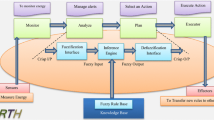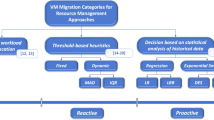Abstract
High energy consumption in data center has serious impacts on environment. Energy-efficient scheduling under Customer Satisfaction Level (CSL) constraint has become a key problem of cloud computing in data centers. In this paper, a CSL-driven and energy-efficient resource scheduling (CDEERS) framework has been designed to optimize energy efficiency and CSL in cloud data centers. To achieve different goals in different CSL states, three scheduling strategies (aiming to minimize energy saving, maximize CSL and maximize CSL per energy, respectively) are auto-adaptively applied to consolidate resources according to CSL states. To identify CSL states, a metric based on Service Level Agreement (SLA) violation rate (MSVR) is designed and applied in the proposed method. Additionally, the Weighted Moving Average (WMA) model is applied to predict the future state of CSL and optimize the resource allocation. Simulation result shows that the MSVR improves energy efficiency (CSL per energy) by 51.1% and 30.4% compared with traditional metric based on workload (MW) and metric based on response time (MRT), respectively, during the whole test period. It reduces the SLA violation rate by 7.9% and the number of host overloads by 9.6%, respectively, while prediction mechanism is applied. It shows that CDEERS has better energy efficiency than these static scheduling methods with single objection in the condition of dynamic state of CSL.









Similar content being viewed by others
References
Beloglazov A, Buyya R (2013) Managing overloaded hosts for dynamic consolidation of virtual machines in cloud data centers under quality of service constraints. IEEE Trans Parallel Distrib Syst 24(7):1366–1379
Wirtz T, Ge R, Zong Z, Chen Z (2013) Power and energy characteristics of MapReduce data movements. In: 2013 International Green Computing Conference (IGCC), IEEE, pp 1–7
Zaharia M, Xin RS, Wendell P, Das T, Armbrust M, Dave A et al (2016) Apache spark: a unified engine for big data processing. Commun ACM 59(11):56–65
Chen J, Li K, Tang Z, Bilal K, Yu S, Weng C, Li K (2017) A parallel random forest algorithm for big data in a spark cloud computing environment. IEEE Trans Parallel Distrib Syst 1:1–1
Yang H, Liu X, Chen S, Lei Z, Du H, Zhu C (2016) Improving Spark performance with MPTE in heterogeneous environments. In: 2016 International Conference on Audio, Language and Image Processing (ICALIP), IEEE, pp 28–33
Gounaris A, Kougka G, Tous R, Montes CT, Torres J (2017) Dynamic configuration of partitioning in spark applications. IEEE Trans Parallel Distrib Syst 28(7):1891–1904
Lin X, Wang Y, Xie Q, Pedram M (2015) Task scheduling with dynamic voltage and frequency scaling for energy minimization in the mobile cloud computing environment. IEEE Trans Serv Comput 8(2):175–186
Tian W, Zhao Y, Xu M, Zhong Y, Sun X (2015) A toolkit for modeling and simulation of real-time virtual machine allocation in a cloud data center. IEEE Trans Autom Sci Eng 12(1):153–161
Dai X, Wang JM, Bensaou B (2016) Energy-efficient virtual machines scheduling in multi-tenant data centers. IEEE Trans Cloud Comput 4(2):210–221
Li H, Zhu G, Cui C, Tang H, Dou Y, He C (2016) Energy-efficient migration and consolidation algorithm of virtual machines in data centers for cloud computing. Computing 98(3):303–317
Beloglazov A, Abawajy J, Buyya R (2012) Energy-aware resource allocation heuristics for efficient management of data centers for cloud computing. Fut Gener Comput Syst 28(5):755–768
Kusic D, Kephart JO, Hanson JE, Kandasamy N, Jiang G (2009) Power and performance management of virtualized computing environments via lookahead control. Clust Comput 12(1):1–15
Lovász G, Niedermeier F, De Meer H (2013) Performance tradeoffs of energy-aware virtual machine consolidation. Clust Comput 16(3):481–496
Buyya R, Yeo CS, Venugopal S, Broberg J, Brandic I (2009) Cloud computing and emerging IT platforms: vision, hype, and reality for delivering computing as the 5th utility. Fut Gener Comput Syst 25(6):599–616
Srikantaiah S, Kansal A, Zhao F (2008) Energy aware consolidation for cloud computing. In: Proceedings of USENIX workshop on power aware computing and systems in conjunction with OSDI, ACM, pp 1–5
Wu L, Garg SK, Versteeg S, Buyya R (2014) SLA-based resource provisioning for hosted software-as-a-service applications in cloud computing environments. IEEE Trans Serv Comput 7(3):465–485
Verma A, Dasgupta G, Nayak TK, De P, Kothari R (2009) Server workload analysis for power minimization using consolidation. In: Proceedings of the 2009 Conference on USENIX Annual Technical Conference. USENIX Association, p 28
Beloglazov A, Buyya R (2012) Optimal online deterministic algorithms and adaptive heuristics for energy and performance efficient dynamic consolidation of virtual machines in cloud data centers. Concurr Comput Pract Exp 24(13):1397–1420
Choi J, Govindan S, Jeong J, Urgaonkar B, Sivasubramaniam A (2010) Power consumption prediction and power-aware packing in consolidated environments. IEEE Trans Comput 59(12):1640–1654
Zhu Y, Halpern M, Reddi VJ (2015) Event-based scheduling for energy-efficient qos (eqos) in mobile web applications. In: 2015 IEEE 21st International Symposium on High Performance Computer Architecture (HPCA), IEEE, pp 137–149
Agrawal S, Bose SK, Sundarrajan S (2009) Grouping genetic algorithm for solving the serverconsolidation problem with conflicts. In: Proceedings of the First ACM/SIGEVO Summit on Genetic and Evolutionary Computation, ACM, pp 1–8
Quang-Hung N, Nien PD, Nam NH, Tuong NH, Thoai N (2013) A genetic algorithm for power-aware virtual machine allocation in private cloud. In: Information and Communication Technology-EurAsia Conference, Springer, Berlin, pp 183–191
Eberhart R, Kennedy J (1995) A new optimizer using particle swarm theory. In: Proceedings of the Sixth International Symposium on Micro Machine and Human Science, 1995. MHS’95, IEEE, pp 39–43
Del Valle Y, Venayagamoorthy GK, Mohagheghi S, Harley RG, Hernandez JC (2008) Particle swarm optimization: basic concepts, variants and applications in power systems. IEEE Trans Evol Comput 12(2):171–195
Zeng N, Wang Z, Zhang H, Alsaadi FE (2016) A novel switching delayed PSO algorithm for estimating unknown parameters of lateral flow immunoassay. Cogn Comput 8(2):143–152
Xiong AP, Xu CX (2014) Energy efficient multiresource allocation of virtual machine based on PSO in cloud data center. In: Mathematical Problems in Engineering, 2014
Li H, Zhu G, Zhao Y, Dai Y, Tian W (2017) Energy-efficient and QoS-aware model based resource consolidation in cloud data centers. Clust Comput 20(3):2793–2803
Shashikant I, Kotagiri R, Rajkumar B (2019) ETAS: energy and thermal-aware dynamic virtual machine consolidation in cloud data center with proactive hotspot mitigation. Concurr Comput Pract Exp 31(17):1–15
Wenhong T, Majun H, Wenxia G, Wenqiang H, Xiaoyu S, Mingsheng S, Adel N, Rajkumar B (2018) On minimizing total energy consumption in the scheduling of virtual machine reservations. J Netw Comput Appl 112:64–74
Sukhpal S, Inderveer C, Rajkumar B (2017) STAR: SLA-aware autonomic management of cloud resources. IEEE Trans Cloud Comput 7(3):465–485
Zhu X, Young D, Watson BJ, Wang Z, Rolia J, Singhal S et al (2008) 1000 islands: integrated capacity and workload management for the next generation data center. In: International Conference on Autonomic Computing, 2008. ICAC’08, IEEE, pp 172–181
Sun Y, White J, Eade S, Schmidt DC (2016) ROAR: a QoS-oriented modeling framework for automated cloud resource allocation and optimization. J Syst Softw 116:146–161
Jung G, Hiltunen MA, Joshi KR, Schlichting RD, Pu C (2010) Mistral: dynamically managing power, performance, and adaptation cost in cloud infrastructures. In: 2010 International Conference on Distributed Computing Systems, IEEE, pp 62–73
Guenter B, Jain N, Williams C (2011) Managing cost, performance, and reliability tradeoffs for energy-aware server provisioning. In: IEEE 2011 Proceedings of INFOCOM IEEE, pp 1332–1340
Bobroff N, Kochut A, Beaty K (2007) Dynamic placement of virtual machines for managing sla violations. In: 10th IFIP/IEEE International Symposium on Integrated Network Management, 2007. IM’07, IEEE, pp 119–128
Farahnakian F, Liljeberg P, Plosila J (2013) LiRCUP: linear regression based CPU usage prediction algorithm for live migration of virtual machines in data centers. In: 2013 39th EUROMICRO Conference on Software Engineering and Advanced Applications (SEAA), IEEE, pp 357–364
Farahnakian F, Pahikkala T, Liljeberg P, Plosila J (2013) Energy aware consolidation algorithm based on k-nearest neighbor regression for cloud data centers. In: 2013 IEEE/ACM 6th International Conference on Utility and Cloud Computing (UCC), IEEE, pp 256–259
Ye Z, Mistry S, Bouguettaya A, Dong H (2016) Long-term QoS-aware cloud service composition using multivariate time series analysis. IEEE Trans Serv Comput 9(3):382–393
Gupta P, Vishwakarma L, Patel A (2014) Power-aware virtual machine consolidation considering multiple resources with live migration. Int J Comput Appl 103(17):24–30
Rajyashree VR (2015) Double threshold based load balancing approach by using VM migration for the cloud computing environment. Int J Eng Comput Sci 4(01):9966–9970
Calheiros RN, Ranjan R, Beloglazov A, De Rose CA, Buyya R (2011) CloudSim: a toolkit for modeling and simulation of cloud computing environments and evaluation of resource provisioning algorithms. Softw Pract Exp 41(1):23–50
Acknowledgements
This work was supported by the National Natural Science Foundation of China (Grant Nos. 6167060383, 61650110513, 61672004, 61602073), Chongqing science and Technology Commission Project (Grant Nos.: cstc2017jcyjAX0142 and cstc2018jcyjAX0525), Key Research and Development Projects of Sichuan Science and Technology Department (Grant No: 2019YFG0107). It was also supported by Chongqing Engineering Technology Research Center of Mobile Internet Data Application and Program for Innovation Team Building at Institutions of Higher Education in Chongqing.
Author information
Authors and Affiliations
Corresponding author
Additional information
Publisher's Note
Springer Nature remains neutral with regard to jurisdictional claims in published maps and institutional affiliations.
Rights and permissions
About this article
Cite this article
Li, H., Zhao, Y. & Fang, S. CSL-driven and energy-efficient resource scheduling in cloud data center. J Supercomput 76, 481–498 (2020). https://doi.org/10.1007/s11227-019-03036-9
Published:
Issue Date:
DOI: https://doi.org/10.1007/s11227-019-03036-9




